- From Faith Current: “The Sacred Ordinary: St. Peter’s Church Hall” - May 1, 2023
- A brief (?) hiatus - April 22, 2023
- Something Happened - March 6, 2023
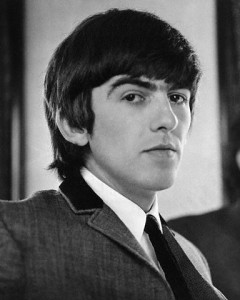
“They have everything over there. Why do they need us?” Two words, George: Bobby Vinton.
This morning as I awoke, I had a fun little idea (which must be all over the web): in order to demonstrate the impact The Beatles had on American popular music, HD will post the #1 hit from the Billboard charts for every week in 1964.
This week fifty years ago, the top spot was occupied by Bobby Vinton’s “There! I’ve Said It Again.” It would slumber immovably at #1 for the rest of the month. I think everybody knew how soporific this song was; that’s why they put that jaunty exclamation point in the title. Not enough, fellas, not nearly enough.
Consider yourself lucky I didn’t start this earlier: Vinton’s record had ousted “Dominique,” by The Singing Nun, which should not be listened to under any circumstances. What can I say, the nation was grieving. 1963: America’s Shittiest Christmas.
“Sister Smile”‘s try at immortality had replaced “I’m Leaving it All Up to You,” by Dale and Grace, which is at least respectable in a country-fried sort of way. Meaning, it might sound OK on the radio of a beat-up pickup seven miles outside Chilicothe, MO, as you’re picking Cracker Barrel breakfast out of your teeth and contemplating how on earth you came to live in the miserable ass-end of nowhere.

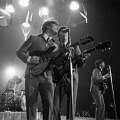
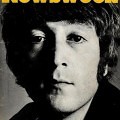
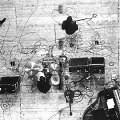
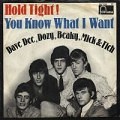
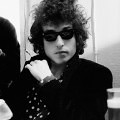
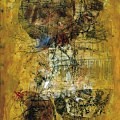
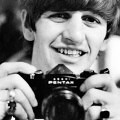
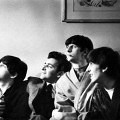
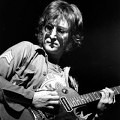
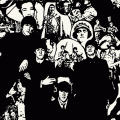
Here’s a quote from Jerry Lee Lewis: “Thank God for the Beatles, they got rid of all the Bobbies, the Frankies and the Fabians.”
The record companies had decided that guitar groups were out, so gallons of brylcreem were being applied to the finger-snapping heartthrobs who could be seen lip-synching their string-drenched mediocrities on Bandstand. I remember seeing Bobby Rydell. I was only five, but I knew I hated that music. It took the Beatles and the Brit invasion to convince the moneymen that guitar groups could sell records. Then a thousand untalented noisemakers were signed up. So the pendulum swung the other way.
We can make the argument that pre-Beatles American pop music was a wasteland, but I loved me some Everly Brothers. I listened to every record my older siblings played (couldn’t avoid it) and as much as I hated Bobby Rydell and Vinton and Vee, the Everlys thrilled me the way the Beatles did later:
This is them in 1964:
http://www.youtube.com/watch?v=vTUP3Yncx68
The Beatles reviewed this record on “Juke Box Jury” on 7 December 1963. Here’s what they had to say about “There, I’ve Said It Again”:
GEORGE: “Umm, it’s quite nice, but I mean, I don’t think the record buying public buys this sort of stuff, I mean, the majority — which will make it a miss. But you know, it’s quite alright. I wouldn’t buy it me-self.”
JOHN: “Uhh, well, I dunno. What is Bobby Vinton doing? He’s bringing the oldies back. He might do it, but people always cover them over here. But especially anything old. You know, everybody does it all at once. And he missed it with the last one here. (loudly, comically) I THINK HE’S GONNA MISS IT WITH THIS ONE TOO!!”
(laughter)
PAUL: “Umm, yeah. I think the thing about bringing back old songs and doing them these days, teenagers don’t really want old songs brought back. I’m sure they’d like to have songs that they can call their own instead of bringing back their mum and dad’s songs.”
DAVID JACOBS: “Well now, just a minute. What about Frank Ifield and all that lot?”
PAUL: “Yeah, okay.”
GEORGE: “What about Mule Train?”
(laughter)
PAUL: “Yeah well, you’re probably right. But I’m sure that if you could get songs these days as GOOD as the old ones, only new songs, that would be ten times better.”
JOHN: “Frank Ifield… that’s just practically the same as the old.”
DAVID JACOBS: “I might tell you that I’m terrified of disagreeing with you chaps, you know, in front of all these people. However, let’s see what Ringo says. Ringo.”
RINGO: “I liked it, you know. It’s nice and smooth. And if you’re sort of staying in one night, put it on.”
(laughter)
RINGO: “But yeah, right. It won’t sell.”
DAVID JACOBS: “Thank you, Don Juan Starr.”
(Beatles vote by holding up cards. Consensus: MISS)
Superb, @JR. Bravo.
That “Juke Box Jury” dialogue is priceless.
Looking at the #1 songs at the time in this way is making me think I ought to read Elijah Wald’s “How The Beatles Destroyed Rock n Roll,” just to figure out how he’s lining up that argument against this sort of evidence.
I don’t know.
The “there was nothing before the Beatles” argument has been made many times, and I made it many times myself. I remember when WNEW-FM broadcast the BBC “History Of The Beatles” radio documentary in 1970, and Brian Matthew played snippets of Johnnie Ray’s “Cry” as part of his “this is people were listening to before the Beatles” introduction. But I don’t buy that particular story anymore. Sure, we can laugh at Dale and Grace, but making them representative of what was happening musically back then is the same as holding up Britney Spears and Miley Cyrus as representatives of our age.
The Beatles didn’t enter a vacuum in the U.S. To believe they did does a real disservice to Bessie Banks
http://www.youtube.com/watch?v=PZkC8tlOcEk
As well as Little Eva, Smokey Robinson, Mickey & Sylvia, Arthur Alexander and other hardworking entertainers of that period. Many of their songs were covered by the Brit Invasion folks, obscuring the originals. But lets not fool ourselves that Dale and Grace were the only game in town.
@Sam, I think we can and should hold two ideas at once:
1) Yes, there were people making great music in the post-Elvis, pre-Beatles period;
2) But the “hit parade” was not usually featuring that music, it was featuring Dale and Grace.
This leads to the question “why,” which I find ultimately much more interesting than assertions of preference or ranking. And also: even though the hit parade is artificial, it was powerful, and represents something that really existed–perhaps the authentic preferences of the public, perhaps racism, perhaps fear of the new, perhaps the domination of a few urban areas over the rest of the country, perhaps the “manufacturing” of commercial success via payola…maybe all these things, I don’t know. But The Beatles were seen as a seismic event in their time, a before and after shift in popular music, and that perception needs to be noted and, if possible, explained. What did Beatle music replace? Can we, from our perch in the future, see why that might’ve happened? Why didn’t Bessie Banks, Little Eva, Smokey, Mickey & Sylvia, Arthur Alexander, et al do what The Beatles did? That question doesn’t necessarily mean that Bessie, Eva etc were worse musicians; but as all the jazz musicians whose livelihood dried up after February 1964 can tell us, music was only a part of it, and maybe not even the biggest part.
The only reason Britney Spears and Miley Cyrus aren’t similarly representative of our age is the vast splintering of media. In some limited sense–the “what teenage girls are listening to” sense–they are representative of our age, along with Bruno Mars, Maroon 7 and Lady Gaga. The difference is that 1964’s hit parade had much, much more cultural weight than 2014’s does. There was in 1964 a genuine mainstream–caused by scarcity and lack of choice–that not only doesn’t exist any more, it’s difficult to imagine. The Beatles on Ed Sullivan reached a kind of cultural simultaneity and omnipresence only matched in totalitarian societies. That is an experience utterly alien to us today; the point that “there were lots of people doing great stuff” is less so, IMHO, which is why I am more interested in the former thought than the latter. But that latter thought is also correct.
BTW, @Sam, I’ve always thought that version of “Go Now” is shatteringly great. The ferment of Motown and Stax–of soul music in general–suggests to me that something was on the verge. But what happened had the face of The Beatles, and I’ve always thought that was crucial.
Michael, well said; I agree with you that we can and should hold two ideas at once.
The artists I mentioned were doing great work, but weren’t burning up the charts. The spotlight was shining on the mediocre and inauthentic Bobbies and Frankies and Fabians. The Motown and Stax soul music was marginalized, just as “race” music had been in the ’50s and before. When the Beatles hit, I remember there was a huge attempt to marginalize them as well; just look at what the “straight” press was writing about them: Long-haired weirdos with noisy guitars and bursts of “improbable harmonies” (I think the nytimes called it)… but the songs were too brilliant, and the record sales were too enormous to ignore. And soon, those same nytimes journalists were growing out their hair and listening seriously to Rubber Soul.
You’re right, the hit parade was (is) powerful, and that’s what historians look at.
I’m certain, fifty years from now, commenters will be pointing to “Gangdam Style” and accusing us of all dancing to it, and a few septuagenarians will be saying “no, wait, not all of us.”
@Sam, well said. And it’s remarkable to see how the straight press did try to resist The Beatles, only to be exposed as utter fools–in other words, how much of that mainstream was a concerted effort by some people. How it wasn’t what it claimed to be, simply what the majority liked, but something much more complex. Something that was, in some sense, fraudulent. That’s the moment our current media world was born.
The trackable nature of media today will offer historians who care to look a much more granular view of culture–this group is listening to x, and this group is listening to y, and x’s fans live in cities and uses computers, and y’s fans live in rural areas and so forth. Were something like The Beatles to come along today, they would’ve been known since the Litherland Town Hall gig–which might have kept them from cooking down into the rich broth we know. So much of The Beatles’ story is the breaking of the dam, and that’s what my post intended to kick off; what it sounded like, when the dam broke.
Don’t forget other significant artists of the pre-Beatles interim like Ray Charles, Dion, Sam Cooke, Darlene Love (and her Philles stablemates), Booker T and the MGs, the Beach Boys, and the Beatles’ beloved Roy Orbison, in addition to their beloved and already-linked Everly Brothers. (“Please Please Me” was first conceived and performed in imitation of Orbison, while the final recording bears the clear influence of the Everlys’ “Cathy’s Clown,” #1 in 1960.) That’s in addition, as noted, to the Motown artists, who’d racked up a dozen chart-topping, game-changing classics by the time the Beatles came. All had hits with music every bit as timeless as the Beatles’, if not quite so pregnant with all kinds of artistic, social, and cultural potential.
If artists like the above-named weren’t precisely dominating the Hit Parade and therefore dictating the taste of the mainstream, it’s only because the mainstream was, circa 1960-63, far more varied than the critical-historical narrative always had us believe. That narrative had always been: Rock ‘n’ roll was great, then Elvis went into the army; Buddy Holly (and Eddie Cochran) died; Chuck Berry went to jail; Little Richard found God; Jerry Lee Lewis, wedded to his cousin and in disgrace, went country; etc., and the whole thing would have died on the vine if the Beatles hadn’t come along to save it. Like Sam, I took years to see that narrative as not just historically faulty but foolishly neglectful of artists who were doing good, lasting (and commercially successful) work in the years just before the invasion. Artists who I have always adored and whose music has meant an enormous amount to me, and who were, guess what, making their mark in just the period I’d always been told was nothing but teenage wasteland.
What is indubitable is that the Beatles changed the mainstream in every way — mainly by bringing niches of taste together (who else would have fused Buddy Holly and Motown?) so that a broader base of listeners had something in common, even if they didn’t know it. They blew away most of the chaff, the Singing Nuns and Lawrence Welks and Bert Kaempferts (Beatles ref!) who’d regularly topped the charts just before they came over. (But even there, note that the Beatles didn’t completely stop the “squares” — folks like Frank Sinatra, Dean Martin, Herb Alpert, Henry Mancini, SSgt. Barry Sadler — from having huge US hits throughout their years of dominance; even Bobby Vinton had his last chart-topper, “Mr. Lonely,” at the tail end of ’64, after the Beatles’ conquest was beyond doubt. And those are just the #1 hits; take a look at the Top 40s of 1964-69 and see that, while rock-era pop clearly held sway, it was hardly hegemonic. The mainstream will do what it likes, when it likes.) Someone had to do all that if pop were to evolve into its other, incredibly eclectic forms; if it were going to spread and have a broader cultural influence; if it were going to infiltrate minds and lives on a scale no one had ever suspected it could. Some force had to come along and, as Mike puts it, break the dam, and that force was, and perhaps only could have been, You Know Who.
Dale and Grace? I’ve always loved that record as a minor exemplar of the sweet and tuneful high-school romantic devotional, like “Hey Paula” or the Fleetwoods’ “Mr. Blue” or Lonnie Brooks’s “Mission Bell.” There’s something heartbreaking about the innocence of so much pre-Beatles pop, even though a lot of people then and now hear it as toothpicking music for hillbillies, or prom-night valentines for suburban teens.
Nancy, the Elijah Wald book doesn’t really take on any of these issues. Rather than the come-together-under-me view of the Beatles’ effect on musical culture, he proposes that they had a splintering, segregating effect on an audience that was more unified before they came. His title is a come-on, and a rather cheap one, and I have zero doubt it was imposed by his agent or editors. See my brief review: http://www.bookforum.com/review/4002
Thanks for that link, Devin — I think I learned what I needed to about Wald’s argument from your review. I had heard before that Wald was claiming an initially more unified music audience was split by the advent of Beatles and bands/performers like them, but that didn’t make sense to me given the way the Beatles’s music combined disparate styles and brought together such a huge audience. Your point about Wald’s argument being more about how technology and celebrity altered the popular music landscape does make sense.
I was especially interested in this part of your review:
“Although conventional music history has focused on the singer-star, audiences eighty years ago cared chiefly about songs, not performers: Sheet-music sales measured a tune’s popularity, and a fan’s enjoyment wasn’t bound to a particular singer’s rendition.”
One of the things that differentiates the Beatles from other bands, IMO, is that practically their entire song catalog is worth covering, and a huge proportion of it has been covered in different styles, many of which work. Besides turning in great and defining performances of their own songs, they created songs that travel amazingly well.
You’re right about their songs traveling, Nancy, and one thing the Beatles had in common with Bob Dylan was that listeners didn’t have to like the artist to like their songs — exactly because they adapted so well to other performers’ styles. My dad, for instance, hated Dylan’s voice, but loved his songs when done by people he felt could actually sing (PP&M’s “Blowin’ in the Wind,” the Byrds’ “Mr. Tambourine Man”). By the same token, I’m certain a lot of people who hated or simply disdained the Beatles as an entity wound up loving some of their songs — usually Paul songs (“Yesterday,” etc.). That’s a whole other way of making the mainstream your own — writing songs that travel — and most other artists simply couldn’t do that.
Here’s an oddity/rarity: The Everly Brothers mashing it up with Gerry & The Pacemakers. Gerry and his group represented the British invasion. Phil & Don represented the late ’50s (Buddy Holly & the Crickets were their backing group on one tour, Phil collaborated with Buddy on “Stay Close To Me”, they were all best friends with Eddie Cochran):
http://www.youtube.com/watch?v=cTkDrv6g63c